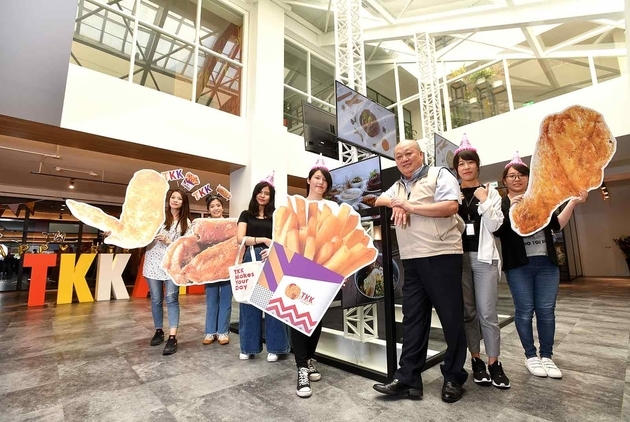An Old Brand Growing Younger
TKK Fried Chicken Teams up with Kung Fu Tea to Conquer New York

Source:Kuo-Tai Liu
TKK Fried Chicken was Taiwan’s first local fried chicken brand but fell off the radar for many years as foreign fast food brands took over the market. Now, it is seeing a resurgence, seemingly growing younger and even making a name for itself in New York.
Views
TKK Fried Chicken Teams up with Kung Fu Tea to Conquer New York
By Meng-Hsuan Yangweb only
Hidden amid several large-scale furniture showrooms in the Wugu Industrial Park, the headquarters of TKK Fried Chicken’s headquarters still tries to catch the eye with its colorful exterior. The building’s spacious first-floor lobby, with its minimalist black and white design and a bar with a sofa and dining table to the side has all the trappings of a trendy startup.
But walk into the fourth-floor office of TKK Fried Chicken General Manager Edward Shih (史洪法) , and one sees a collection of wooden carvings and a traditional tea brewing table near the doorway. Shih wears a signature beige TKK Fried Chicken vest and makes himself comfortable in a Chinese-style wooden seat for an interview with CommonWealth.
TKK Fried Chicken has built a new image under the leadership of General Manager Edward Shih (third from right) and his son Calvin Shih, helping sales grow 64% from 2015 to 2018. (Photo by Kuo-Tai Liu/CW)
This fusion of new and old exemplifies the company’s recent past.
Capitalizing on a completely new look, TKK Fried Chicken has generated strong growth since 2015. The chain has seen its retail network expand from 46 to 70 stores and its revenues soar from NT$550 million to NT$900 million. It has also represented other food brands in Taiwan, set up stores in the United States and even sold chicken essence.
Appealing to Western Tastes
TKK Friend Chicken has already earned rave reviews overseas. On Aug. 14, New York food website Eater NY rated the chain one of 25 “Exemplary Fried Chicken Dishes around NYC.”
When exactly did this pioneer of Taiwanese fried chicken become an American brand? At the end of last year, TKK Fried Chicken teamed up with Kung Fu Tea to create a space combining their products near Baruch College in Manhattan that was an immediate hit and continues to do well.
Talking about his company’s move into the United States, Shih says Kung Fu Tea, a tea beverage chain set up by four young Taiwanese in the U.S. that now has 200 branches, provided the main spark.
“They insist on using Taiwanese tea leaves, which is similar to TKK’s philosophy, and they were interested in our fried chicken. So we became each other’s agent and partner,” Shih says.
TKK Fried Chicken has contributed its know-how to the partnership but left the store plan to Kung Fu Tea, which was familiar with the American market. They expect to open another five outlets by the end of the year.
“We did a market survey and found that in New York, all groups are very accepting of Taiwan-style fried chicken, but people from the South really love it,” Shih says.
To cater its products to local taste buds, the chicken chain offers two main options: the “original” Taiwan-style “thin skin” chicken and American-style crispy chicken. It also sells both regular potato and sweet potato fries. Surprisingly, American consumers have taken to the sweet potato fries and Taiwan-style chicken, and the chain’s limited-edition signature product, “Kwa Kwa Bao” (described as sticky rice with bits of shiitake mushrooms and pork stuffed in fried chicken skin), often sells out on the spot.
New Strategy
This chicken and tea beverage fusion has also been brought back to Taiwan, with stores set up in eastern Taipei, Xinzhuang and the Hualien train station. They have added purple to TKK Fried Chicken’s traditional red and yellow color scheme, and the stores’ mainstays – fried chicken, fries and bubble tea – appear on the wall as street graffiti, giving the spaces a modern feel, a marked contrast to the outdated image that burdened TKK Fried Chicken for years.

TKK Fried Chicken General Manager Edward Shih’s strategy to represent new overseas brands in Taiwan has paid off by giving his chain a broader and fresher line of offerings. (Photo by Kuo-Tai Liu/CW)
The collaboration with Kung Fu Tea reflects a new strategy adopted since 2015 to work with overseas food brands and represent them in Taiwan. The company now has six foreign brands under its corporate umbrella – Korean squid chain Uncles Taiwan, casual Korean food brand Bobby Box, Japanese noodle shop Abura Soba, no-cutlery Malaysian seafood brand Shell Out, Kung Fu Tea and Singapore’s pork ribs soup brand Founder Bak Kut Teh.
Shih went down the partnership road because the food & beverage industry devotes significant manpower and funds to developing new products, only to see the majority of them fail shortly after hitting the market.
“It made more sense to directly represent new brands and introduce them to customers,” Shih explains.
His vision for expansion focused on piecing together a mosaic of brands specializing in main dishes, beverages, noodles and sweets that eventually coalesce into a TKK restaurant collection full of enticing tastes.
Expanding against the Tide
Aside from expanding into the United States, TKK Fried Chicken has recently upped its game in part because of its willingness to buck the trend and expand its retail presence.
When the company was founded in 1974, it was Taiwan’s first fried chicken chain. It was not until after McDonald’s and KFC entered Taiwan in 1984, however, that the fast food sector started growing rapidly and entered its golden age, Shih recalls.
But the speed at which the foreign brands expanded their networks, giving McDonald’s more than 400 stores around Taiwan today and KFC more than 100, left TKK Fried Chicken lagging behind. Its much slower pace of expansion and lack of advertising gradually cost it the attention of consumers.
“The truth is we’ve always been around, but our competitors expanded so quickly that some people thought TKK Fried Chicken had disappeared,” Shih says.
He even recalls running into a dentist friend, who asked when he found out that Shih headed TKK Fried Chicken: “Didn’t TKK go under?”
Over the past four years, however, TKK Fried Chicken outlets have started to pop up in high traffic areas, such as next to the Sogo Department Store near the Zhongxiao-Fuxing MRT stop and on Xinyi Rd. near the Dongmen MRT station.
“The [retail] market has not been that good recently, so locations that I could never get my hands on are opening up one by one. I think a good opportunity has arrived, and I’ve started acquiring [some of these spots],” Shih says.
Yet, finding stores in prime locations is no longer TKK Fried Chicken’s main concern, its strategy having shifted with the times. Shih explains that the company used to favor a network of one mall location for every three roadside shops, but that has changed to a ratio of 3:1 today.
“This is the future trend. The weather is so hot now, who still wants to spend time walking around outside to shop? Everybody heads to the mall,” he argues.
As TKK Fried Chicken has continued to expand its number of locations, it has also shut down shops that have failed to pull their weight, enabling the chain to increase per store sales without a corresponding increase in manpower.
Shih has also quietly improved the quality of the chain’s product since beginning to demand chicken of a stricter “D+2” standard in 2016. The “D+2” standard refers to a bird reaching a store for sale within two days after being slaughtered. The company also sends one of its people to the slaughterhouse of its chicken supplier, Charoen Pokphand Enterprise (Taiwan), to keep an eye on quality.
Hung Yao-don, the general manager of frozen chicken specialist Charming Food International Marketing, explains that while frozen chickens have a freshness date of seven days from the time of production under the country’s certified agricultural standards (CAS) for meat, there have been cases where the chicken goes bad in just 3-4 days.
“TKK Fried Chicken’s D+2 requirement is based on a long-term rule of thumb and its desire to sell meat at its safest point,” Hung says.
Third-generation Takes TKK Younger
Through this organizational makeover, TKK Fried Chicken has gotten younger, and the main force behind that is Shih’s son Calvin Shih (史宗岳). This third-generation member of the Shih clan joined the company three years ago and is now the company’s vice general manager. He has taken charge of its representation of other brands and the renovation of its headquarters.
Edward Shih Hung-fah describes his collaboration with his son this way: “He goes out and finds appropriate brands and comes back to discuss them with me. If it makes sense, we become the brand’s representative [inTaiwan].”
Taiwan Chain Stores and Franchise Association secretary-general Winnie Hung is a longtime friend of the Shih family. She observes that Calvin, who was educated overseas, brought an international perspective and excellent connections with other young entrepreneurs when he joined his father’s company, injecting fresh energy into the brand.
In renovating the company’s Wugu headquarters, the son turned the building into what appears to be a cool, tech startup space, complete with a fitness center, sky garden and KTV. The father had mixed feelings about the design when he first saw it “because my father [TKK founder Shih Kwei-ting] once said that TKK does not advertise and keeps costs down as much as it can to reward customers with lower prices.”
 TKK Fried Chicken Vice General Manager Calvin Shih, a third-generation member of the Shih family, has injected new energy into the brand, including by renovating its headquarters (pictured is the new lobby). (Photo by Kuo-Tai Liu/CW)
TKK Fried Chicken Vice General Manager Calvin Shih, a third-generation member of the Shih family, has injected new energy into the brand, including by renovating its headquarters (pictured is the new lobby). (Photo by Kuo-Tai Liu/CW)
Calvin Shih’s vision was indeed at odds with his grandfather’s values. The project took more than a year to complete at substantial cost, and he also invested in social media marketing to create a buzz among a younger customer segment.
But his father let him run with it. “[He] studied overseas and has seen a lot. Also, we’re seeing generational change, and the TKK brand may have seemed outdated to the new generation a long time ago,” Edward Shih.
Winnie Hung believes the company has skillfully handed its fusion of the old and new. “The company’s mascot Ah Yung epitomizes today’s TKK. He represents TKK’s core values and cannot disappear. But his new look is handsome and trendy and much more in tune with the market,” she says.
In a second floor office at company headquarters, Edward Shih points to an exposed cement pillar adorned with glass decorations and admits that if he been aware of this design early on he never would have allowed it. But then he noted that the new building has been a stop on visiting Vietnamese business groups’ tours of the Wugu Industrial Park, which he couldn’t help but feel proud about.
“After the change, the truth is that we’re gradually getting more positive reaction,” he says.
In another five years when TKK Fried Chicken turns 50, Edward Shih intends to hand the baton over to his soon for good, giving the family’s second and third generation a little more time to test ideas and try things together. What seems assured, however, is that as TKK Fried Chicken gets older in the future, it will also be getting younger.
Have you read?
♦ Taiwanese Cuisine Delights Chicago Homeless
♦ Taiwan’s Industry Corps, on Which the Sun Never Sets
♦ How Taiwanese Bubble Tea Conquered the Taste Buds of The Japanese
♦ Yifang Fruit Tea - He Lost NT$ 160M to Build Taiwan’s Top Tea Brand
Translated by Luke Sabatier
Edited by Sharon Tseng











